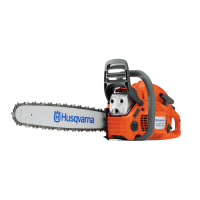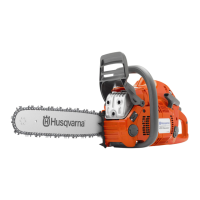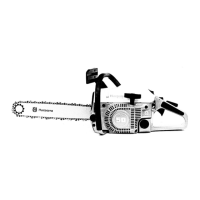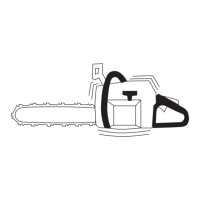Do you have a question about the Husqvarna Rancher 455 and is the answer not in the manual?
Explains symbols for safe operation and warnings.
Welcomes the customer and introduces the product and manual.
Identifies and lists all parts of the chain saw with their numbers.
Lists essential checks and precautions before operating the chain saw.
Provides crucial safety notes and operational guidelines.
Emphasizes caution and seeking expert advice when unsure.
Details required protective gear for safe operation.
Explains the function and importance of safety features.
Describes chain brake and front hand guard function and operation.
Explains the function of the throttle lock mechanism.
Describes the function and importance of the chain catcher.
Explains the purpose of the right hand guard.
Details the vibration damping system and its benefits.
Explains the function and safety aspects of the muffler.
Describes how to use the stop switch to turn off the engine.
Discusses how to choose and maintain cutting equipment for safety.
Provides general guidelines for using cutting equipment.
Explains how cutting equipment affects kickback risk.
Describes bar characteristics relevant to kickback.
Explains chain types and kickback reduction features.
Defines terms related to bar and chain specifications.
Introduces chain sharpening and depth gauge adjustment.
Provides general advice on sharpening cutting teeth.
Offers guidance on setting the depth gauge correctly.
Details the process of adjusting the depth gauge setting.
Explains how to properly tension the saw chain.
Covers the importance and method of lubricating cutting equipment.
Discusses chain oil type, use, and filling procedures.
Explains how to check if the chain is receiving adequate lubrication.
Provides guidelines for checking wear on chains and bars.
Details how to check the bar for wear and damage.
Explains how to check and maintain the chain drive sprocket.
Describes the lubrication of the needle bearing.
Step-by-step instructions for mounting the bar and chain.
Explains fuel type, mixing ratios, and octane recommendations.
Recommends environmentally friendly fuel options.
Provides instructions for the initial running-in period of the engine.
Details the types of two-stroke oil to use and avoid.
Discusses the importance of using the correct chain oil.
Step-by-step instructions for safely refueling the machine.
Outlines critical safety precautions when handling fuel.
Provides guidance on safely transporting and storing the chain saw.
Details procedures for storing the machine for extended periods.
General precautions and overview of starting and stopping procedures.
Specific instructions for starting a cold engine.
Specific instructions for starting a warm engine.
Instructions on how to stop the engine safely.
Lists essential checks to perform before each use.
Provides fundamental safety rules and guidance for working with a chain saw.
Outlines fundamental safety rules to follow during operation.
General advice and rules for safe operation and control.
Defines key terms used in working techniques.
Explains fundamental techniques for cutting wood safely and effectively.
General tips for cutting, including throttle use and kickback.
Instructions for safely removing branches from a tree.
Guidance on cutting logs supported in different ways to avoid jamming.
Explains the principles of felling trees safely.
Specifies the safe distance to maintain during felling operations.
Discusses factors influencing and controlling felling direction.
Details preparing the work area and planning a retreat path for felling.
Describes the three-cut process for felling a tree.
Explains how to make directional cuts for controlled felling.
Details the process of making the final felling cut.
Instructions for safely freeing a trapped or fallen tree.
Guidance on cutting wood under tension to avoid dangerous springback.
Defines kickback and explains what causes it.
Specific kickback risks and precautions during limbing.
Guidance on cutting logs to avoid kickback.
Outlines general maintenance responsibilities and scope.
Explains how to adjust the carburetor for optimal performance.
Covers initial carburetor settings and the running-in period.
Details the process of fine-tuning the carburetor.
Instructions for adjusting the low-speed jet.
Guidance on adjusting the idle speed using the T-screw.
Explains adjustment of the high-speed jet for altitude and conditions.
Describes indicators of a correctly adjusted carburetor.
Covers checks for safety equipment and recommends professional service.
Details checks for the chain brake and front hand guard.
Instructions for checking the wear on the chain brake band.
Describes how to check the front hand guard for damage.
Details how to check the inertia brake release mechanism.
Explains how to check the brake trigger's functionality.
Checks for the throttle lock and its return spring.
Instructions to check the chain catcher for damage and secure fit.
Checks for damage or defects in the right hand guard.
Regular checks for cracks or deformation in vibration damping units.
How to check if the stop switch correctly stops the engine.
Explains muffler checks for secure attachment and condition.
Instructions and warnings related to the starter assembly.
Details how to tension the recoil spring in the starter.
Steps for replacing a broken or worn starter cord.
Instructions for replacing a broken recoil spring.
Steps for correctly fitting the starter assembly.
Explains cleaning and replacement of the air filter.
Discusses spark plug condition, cleaning, and replacement.
Instructions for lubricating the bar tip sprocket.
Details the lubrication of the needle bearing on the clutch drum.
Explains how to adjust the oil pump for proper chain lubrication.
Describes the cooling system and its maintenance.
Explains the "Air Injection" cleaning system and its maintenance.
Provides guidance for operating the machine in cold and snowy conditions.
A comprehensive schedule of daily, weekly, and monthly maintenance tasks.
Lists detailed technical specifications for the chain saw models.
Lists recommended bar and chain combinations for safety and performance.
Details specific bar and chain combinations that meet kickback requirements.
Explains the owner's warranty rights and responsibilities.
Details what parts of the engine are covered by the warranty.
Outlines the owner's responsibilities for maintaining the engine.
Provides instructions on how to file a warranty claim.
General safety precautions for chain saw operators based on standards.
Specific safety advice to prevent and mitigate kickback injuries.
Additional safety measures for operating the chain saw.
| Engine Displacement | 55.5 cm³ |
|---|---|
| Power Output | 2.6 kW |
| Sound Power Level | 114 dB(A) |
| Bar Length | 20 inches |
| Recommended Bar Length | 13-20 inches |
| Chain Pitch | 0.325 inches |
| Chain Gauge | 0.058 inches |











